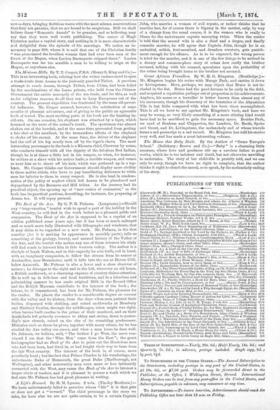The Book of the Axe. By G. P. R. Pulman.
(Longmans.)—Should any " long-vacation " tourist wish to spend a part of his holiday in the West country, he will find in the work before us a pleasant guide and companion. The Book of the Axe is supposed to be a reprint of an edition published some years ago, but it has been so much enlarged and so much more fully illustrated with lithographs and woodcuts, that it may claim to be regarded as a new work. Mr. Pulman, in the first number (for it is making its appearance in monthly parts), tells us something of the geology, botany, and natural history of the Valley of• the Axe, and the tourist who makes any one of these sciences his study will find much to interest him in this western valley. The author is a disciple of Izaak Walton, and in this capacity he sets forth, rod in band, with an imaginary companion, to follow the stream from its source at Aseknoller, near Beaminster, until it falls into the sea at Haven Cliff, below Axmonth. Mr. Pulman is also a lover and a close observer of nature ; he divergea to the right and to the left, wherever an old house, a British earthwork, or a charming expanse of country claims attention. He is well up in folk-lore and local traditions, and in a laborious and painstaking manner he has made original MSS. in the Record Office and the British Museum contribute to the interest of the book ; the labour, be it remembered, has been for Mr. Pulman, the pleasure for the reader. He places the reader to a considerable degree au courant with the valley and its history, from the days when men painted their bodies, dispensed with clothing, and raised earthworks at Membury and Musbury Castles, through the middle-ages, when might was right. when barons built castles in the prime of their manhood, and on their death-beds left princely revenues to abbey and shrine, down to yester- lay's new church, raised on the site of its crumbling predecessor. Histories Mich as these he gives, together with many others, for he has studied the Axe valley con amore, and what a man loves he does well. Dr. Johnson, we believe, said, "The farther I go West, the more con- vinced I am that the Wise Men' came from the East"; the great lexicographer had no Book of the Axe to point out the illustrious men who had been born, had lived in, or had fought their way to fame from the fair West country. The interest of the book is, of course, more peculiarly local ; but the fact that Prince Charles in his wanderings, the unfortunate Duke of Monmouth, the great Duke (Marlborough, not Wellington), and other noteworthy men were more or less intimately connected with the West, may cause the Book of the Axe to interest a larger circle of readers, and it is pleasant to peruse a work which we feel sure Mr. Pulman has had great pleasure in writing.


































 Previous page
Previous page